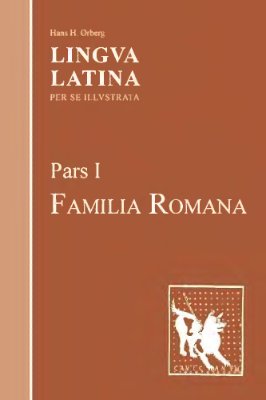Orberg H.H. Lingua Latina per se illustrata. Kolding, 1991.
Lingva latina per se illvstrata, by Hans H. ?rberg, is a Latin course written entirely in Latin. it consists of two parts, Familia romana, the fundamental course, and Roma aetea, the advanced course, with a volume of indices.
Part i, Familia romana, covers the essentials of Latin grammar and a basic vocabulary of some 1500 words. The 35 chapters form a sequence of events in the life of a Roman family in the 2nd century a.d. Each chapter is divided into 3 or 4 lessons (lectiones) and consists of several text pages followed by a grammar section, Grammatica Latina, and 3 exercises, Pensum A, B, C. At the end of the book there is a survey of inflections, a Roman calendar, and a word index, index vocabulorum.
in Part iI, Roma aetea, the subject is Roman history. A description of the city of Rome is followed by a prose version of vergil’s Aeneid I-Iv, with some important passages in the original, and Livy’s Book I supplemented with extracts from Ovid. At first Livy’s prose is gently adapted, but the main part of the book contains unadapted texts by Livy, Aulus Gellius, Coelius Nepos, Sallust, Cicero, and Horace.
Lingva latina per se illvstrata, by Hans H. ?rberg, is a Latin course written entirely in Latin. it consists of two parts, Familia romana, the fundamental course, and Roma aetea, the advanced course, with a volume of indices.
Part i, Familia romana, covers the essentials of Latin grammar and a basic vocabulary of some 1500 words. The 35 chapters form a sequence of events in the life of a Roman family in the 2nd century a.d. Each chapter is divided into 3 or 4 lessons (lectiones) and consists of several text pages followed by a grammar section, Grammatica Latina, and 3 exercises, Pensum A, B, C. At the end of the book there is a survey of inflections, a Roman calendar, and a word index, index vocabulorum.
in Part iI, Roma aetea, the subject is Roman history. A description of the city of Rome is followed by a prose version of vergil’s Aeneid I-Iv, with some important passages in the original, and Livy’s Book I supplemented with extracts from Ovid. At first Livy’s prose is gently adapted, but the main part of the book contains unadapted texts by Livy, Aulus Gellius, Coelius Nepos, Sallust, Cicero, and Horace.

